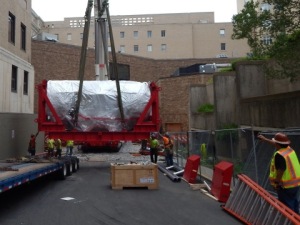by
Lauren Dubinsky, Senior Reporter | June 29, 2015
Ohio will now join a handful of other states in having access to lifesaving proton therapy technology.
Mevion Medical Systems announced today that it has delivered a superconducting synchrocyclotron accelerator for its MEVION S250 proton therapy system under installation at University Hospitals (UH) Seidman Cancer Center and Rainbow Babies & Children’s Hospitals in Cleveland.
“The installation of this MEVION S250 at University Hospitals means cancer patients in Cleveland and the surrounding area will no longer have to travel hundreds of miles from home to receive this important therapy,” Lionel Bouchet, vice president of marketing at Mevion, told DOTmed News.
The installation of the accelerator is an important step in the deployment of the proton therapy system. This will mark Mevion’s sixth installation but it will become the first proton therapy system in Ohio in the spring of next year.
Mevion currently has
three MEVION S250 systems installed for clinical use — The S. Lee Kling at Barnes-Jewish Hospital in St. Louis, Missouri, the Ackerman Cancer Center in Jacksonville, Florida and The Robert Wood Johnson University Hospital in New Brunswick, New Jersey.
“Because the MEVION S250 is the smallest proton therapy system in the world, it can easily be fully integrated inside the Seidman Cancer Center, and as such, patients will receive the full benefits of being part of an NCI-designated Case Comprehensive Cancer Center,” said Bouchet.
UH Siedman Cancer Center is part of the Case Comprehensive Cancer Center at Case Western Reserve University School of Medicine and one of an elite group of 12 freestanding cancer centers around the world designated by the National Cancer Institute as a Comprehensive Cancer Center.
After the accelerator is installed, the system will be put through proton beam tuning and acceptance testing in order to ensure that it meets technical and clinical requirements for clinical use. It is expected to start treating cancer patients in spring 2016.
